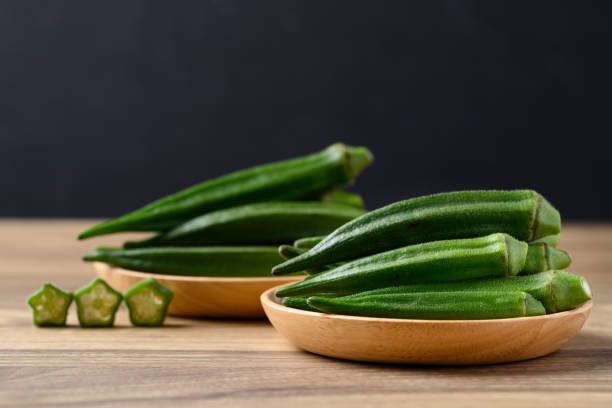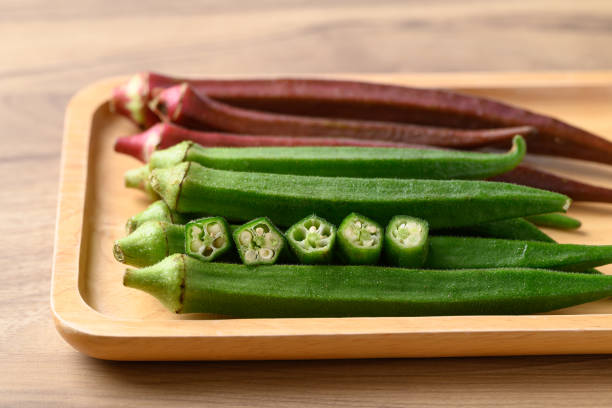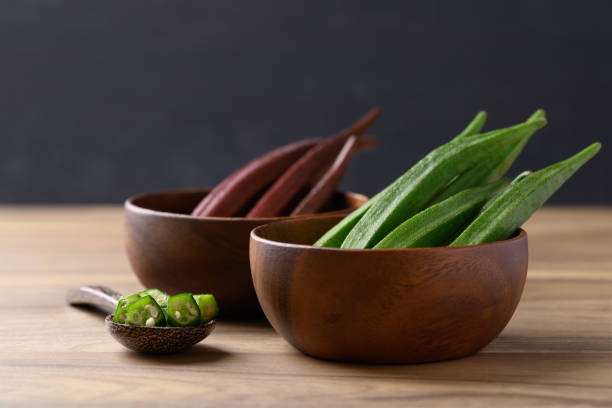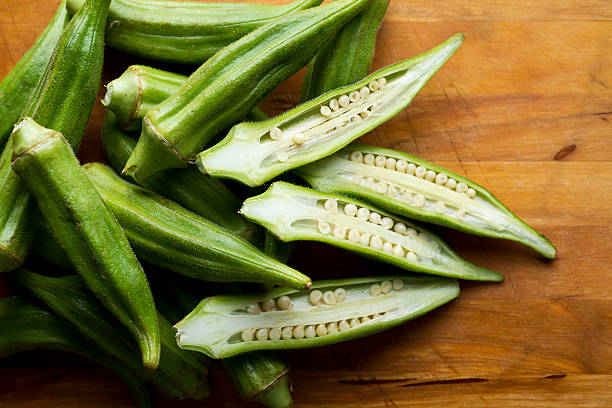Managing blood sugar levels is a key part of staying healthy for people with diabetes or prediabetes. While medications and regular exercise are important tools, what you eat also plays a major role. Choosing the right foods can help keep your blood sugar stable and support overall health. One food that’s getting more attention is okra. This green, finger-like vegetable is not just tasty—it may also help manage blood sugar naturally.
In this article, we’ll take a closer look at okra and blood sugar. You’ll learn about the possible health benefits, how to add okra to your meals, and what current research says about its effects. Ready to find out more? Let’s dive in!
What Is Okra?
Okra, often called “lady’s finger,” is a flowering plant that grows best in warm, sunny climates. It belongs to the mallow family, which also includes plants like hibiscus and cotton. The plant produces long, green pods that are filled with small seeds and a thick, gel-like substance known as mucilage.
People all over the world cook okra in different ways. It’s a popular ingredient in soups, stews, and stir-fries. Some even pickle it or roast it as a snack. But okra isn’t just a tasty addition to meals—it’s also full of vitamins, fiber, and antioxidants. Studies suggest that it may help support healthy blood sugar levels, making it a smart choice for people with diabetes or prediabetes.

Nutritional Value of Okra
Okra is low in calories and rich in nutrients. Here’s what you get in 1 cup of cooked okra:
- Calories: 35
- Carbohydrates: 7 grams
- Fiber: 4 grams
- Protein: 2 grams
- Vitamin C: 26% of the Daily Value (DV)
- Vitamin K: 40% of the DV
- Magnesium: 14% of the DV
- Folate: 24% of the DV
The high fiber content is especially helpful for people with diabetes. Fiber slows down how fast sugar enters your bloodstream, which helps avoid spikes in blood glucose.
Can Okra Really Help Lower Blood Sugar?
Some research suggests that okra may help lower blood sugar levels, especially when it’s part of a healthy diet and lifestyle. Studies have shown that certain compounds in okra, like fiber and antioxidants, may help slow down sugar absorption in the gut. This can lead to fewer spikes in blood sugar after meals.
While more human studies are needed, early findings are promising. Adding okra to your meals may be a simple, natural way to support better blood sugar control—especially for people with diabetes or prediabetes.
How Okra Helps with Blood Sugar:
Slows Sugar Absorption: Okra’s sticky substance, called mucilage, turns into a gel-like texture in the stomach. This gel helps slow down digestion, which can reduce how quickly sugar enters the blood. As a result, blood sugar levels may stay more stable after meals.
Rich in Soluble Fiber: Okra is a great source of soluble fiber, which helps the body use insulin better. This type of fiber can slow sugar absorption and improve insulin sensitivity. It also helps you feel full longer, which may support weight loss—a big factor in managing type 2 diabetes.
Contains Antioxidants: Okra is full of powerful antioxidants, including flavonoids and polyphenols. These nutrients may help lower inflammation and protect the cells in the pancreas that make insulin. Keeping these cells healthy is important for better blood sugar control.
What Does the Research Say?
Early research shows that okra may be helpful in managing diabetes. While most studies so far have been done on animals, the results are promising.
One study published in the Journal of Pharmacy & BioAllied Sciences found that diabetic rats given okra extract had lower blood sugar levels and better cholesterol profiles [source].
Another study in PLOS One reported that okra may help reduce oxidative stress. This is important because oxidative stress can lead to complications in diabetes, such as nerve and blood vessel damage [source].
Although more human studies are needed, these early findings are encouraging. Many people with diabetes or prediabetes already include okra in their diets as a natural way to support blood sugar control.
How to Use Okra to Lower Blood Sugar
There are a few simple ways to add okra to your routine. Try these easy ideas:
1. Okra Water (Okra Soaked Water)
This is one of the most popular methods for people trying to lower blood sugar naturally.
How to Make Okra Water:
- Wash 4–5 fresh okra pods.
- Cut off the ends and slice them lengthwise.
- Soak them in a glass of water overnight.
- Remove the okra and drink the water in the morning on an empty stomach.
Many people say this helps stabilize their blood sugar, though results may vary.
2. Cooked Okra Dishes
You can also enjoy okra in your meals:
- Add it to soups and stews.
- Sauté with garlic and onions for a quick side dish.
- Bake it with olive oil and spices for a crispy, low-carb snack.
3. Okra Powder or Capsules
Okra supplements are available as powders or capsules. These may be easier to take daily, but always talk to your doctor before adding new supplements.

Tips for Including Okra in a Diabetes-Friendly Diet
Want to add okra to your meals? Here are some simple tips to help you get the most out of this healthy veggie:
- Pair it with protein like grilled chicken, fish, eggs, or lentils. This helps balance your meal and keeps blood sugar steady.
- Skip the frying. Instead, try baking, steaming, roasting, or sautéing okra with a little olive oil. These methods keep it healthy and low in fat.
- Mix it with other diabetes-friendly foods such as leafy greens, whole grains, beans, and lean meats to boost nutrition and support better blood sugar control.
- Stay hydrated. Drinking enough water helps your body digest okra’s fiber and keeps your system running smoothly.
Making small changes like these can help you enjoy okra as part of a balanced, diabetes-friendly diet.
Who Should Be Careful?
While okra is safe for most people, there are a few cases where caution is needed.
- People taking metformin: Some animal studies suggest that okra might reduce the effects of metformin, a common diabetes drug. If you’re taking this medication, talk to your doctor before adding large amounts of okra to your diet.
- Those with kidney stones: Okra contains oxalates, which can raise the risk of kidney stones in people who are sensitive to them. If you’ve had kidney stones in the past, it’s best to limit foods high in oxalates.
As with any major diet change, always check with your healthcare provider to make sure okra is a good fit for your personal health needs.
Other Natural Foods That Help Lower Blood Sugar
While adding okra to your meals is a smart move, it’s even more effective when combined with other healthy foods. A balanced diet is key to better blood sugar control. Here are some natural foods that can help:
- Leafy greens like spinach, kale, and collard greens are low in carbs and packed with nutrients.
- Whole grains such as oats, brown rice, and quinoa offer fiber that slows down sugar absorption.
- Chia seeds and flaxseeds provide fiber and healthy fats like omega-3s, which support heart and blood sugar health.
- Cinnamon, when used in small amounts, may help improve insulin sensitivity.
- Berries like blueberries, raspberries, and strawberries are rich in fiber and antioxidants, making them a sweet and healthy choice.
For more information, check out this helpful guide on foods that fight high blood sugar.
Lifestyle Tips to Boost Blood Sugar Control
Eating okra and other healthy foods is a great start—but your daily habits matter too. To get the best results, try adding these simple lifestyle changes:
- Exercise regularly: Aim for at least 30 minutes of movement a day, like walking, biking, or dancing. Physical activity helps lower blood sugar and boosts insulin sensitivity.
- Get enough sleep: Poor sleep can make it harder for your body to manage blood sugar. Try to get 7–9 hours of rest each night.
- Manage stress: High stress levels can cause blood sugar to rise. Deep breathing, meditation, or even a hobby you enjoy can help you stay calm.
- Check your blood sugar often: Regular testing shows how your body reacts to food, exercise, and stress. This helps you make better choices.
Small steps can lead to big changes. Pairing healthy habits with the right foods can make a real difference in your blood sugar control.

Final Thoughts: Is Okra Right for You?
Okra is a nutrient-packed vegetable that could naturally support healthy blood sugar levels. Its high fiber and antioxidant content make it a smart choice for people managing diabetes or prediabetes. Whether you drink okra water or cook it into meals, it’s an easy way to add value to your diet.
But remember: okra isn’t a cure or a replacement for medication. It works best alongside a balanced diet, regular exercise, and medical care.
Ready to Try Okra for Blood Sugar Control?
Have you used okra to manage blood sugar? Do you have a favorite okra recipe? We’d love to hear from you! Share your thoughts in the comments below or ask your questions—we’re here to help!
And if you found this article helpful, please share it with someone who might benefit. Your health journey could inspire others to take the first step.

